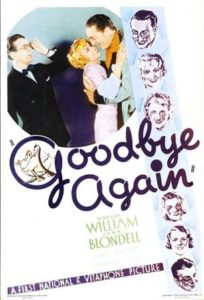“Gentlemen, due to the fact that I have met one of the younger married women of your city, I regret exceedingly that I will be unable to autograph….” Anne (Joan Blondell) to Ken (Warren William)”
Rarely do we venture into pre-code era movies, but that doesn’t ean there are not some fine forgotten treats in the error. Among them must surely be counted 1933’s Goodbye Again, starring Warren William and Joan Blondell in the lead roles, with ample support from Genevieve Tobin and Hugh Herbert, among others.
Though usually cast as a bit of a weasel, here William, who is in almost every second of the films brief but energetic 66 minute run time, is an almost adorable goof. He is Ken Bixby, and smashingly good romance author who spends most of his time traveling from town to town schlepping his books through a combination of radio interviews, lectures, and book signings. Though he still gives lip service to the books and appearances, it is apparent that Bixby is also roaming the country becoming quite a lady’s man.
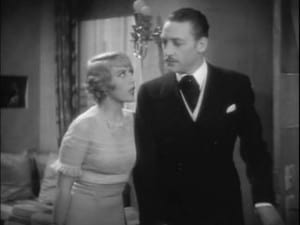 Along for help is Anne (Joan Blondell), his secretary. Not only does she handle all the expected business and travel engagements for Bixby, she also has become an expert in the realm of damage control to contain his extra-curricular activities.
Along for help is Anne (Joan Blondell), his secretary. Not only does she handle all the expected business and travel engagements for Bixby, she also has become an expert in the realm of damage control to contain his extra-curricular activities.
This trait becomes clear early on when Julie (Genevieve Tobin) appears, hoping to rekindle a romance from long ago with the bewitching Bixby. Playing the dupe flawlessly against the cleverly dimwitted Julie it is clear that Bixby has little if any recollection of the woman, much less their relationship.
That said, he is more than willing to dip into the smarmier side of things and take advantage of what he sees as an easy catch. While he is out ‘romancing’ her, her husband Harvey comes up to the Bixby suite hoping just to catch a glance at the esteemed author. It’s clear Harvey (Hugh Herbert) also wants to put a face to what assuredly are countless stories he’s had to listen to from the smitten Julie.
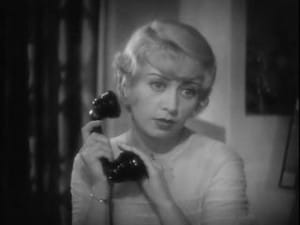 Coming out of an uncharacteristically subdued reel for her, it is here that Blondell assumes more of the self determined and confident portrayals she is known for. For the first time we see that not only is she aware of Bixby’s romantic inclinations, but also that she may not entirely agree with them either. She asks Harvey to stay and wait, which he does- long into the night. Finally she collapses into a couch after several hours of dancing and light flirting. Harvey too has collapsed, though in his case severely drunk and into a nearby chair. There is another almost Dean Martinesque bit of humor here as Harvey’s sister in law and her husband find him in Bixby’s suite, which is worth repeating:
Coming out of an uncharacteristically subdued reel for her, it is here that Blondell assumes more of the self determined and confident portrayals she is known for. For the first time we see that not only is she aware of Bixby’s romantic inclinations, but also that she may not entirely agree with them either. She asks Harvey to stay and wait, which he does- long into the night. Finally she collapses into a couch after several hours of dancing and light flirting. Harvey too has collapsed, though in his case severely drunk and into a nearby chair. There is another almost Dean Martinesque bit of humor here as Harvey’s sister in law and her husband find him in Bixby’s suite, which is worth repeating:
“Why, Harvey, what are you doing here?”
“Oh, just sittin’.”
“What?”
“Plain, old-fashioned sittin’.”
Bixby never appears- his dalliance with Julie ran late- but instead arranges to meet Anne at the train station to depart for their next stop….Albany. Harvey, now with his sister in law and attorney brother in law in tow as well, tag along to the station, as Harvey still wants to lay his eyes on the enigmatic Ken Bixby.
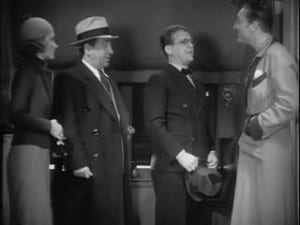 As the train pulls out of the station, Harvey and company spy one of Julie’s bags in the adjoining stateroom and decide to book passage as well, in effect forcing her into Bixby’s sleeping car. With her family in the stateroom on one side and a miffed Anne in the stateroom on the other side, Bixby is ‘forced’ to ‘romance’ Julie again in his sleeping car.
As the train pulls out of the station, Harvey and company spy one of Julie’s bags in the adjoining stateroom and decide to book passage as well, in effect forcing her into Bixby’s sleeping car. With her family in the stateroom on one side and a miffed Anne in the stateroom on the other side, Bixby is ‘forced’ to ‘romance’ Julie again in his sleeping car.
This leads to one of the more popular lines in the film. As the next morning dawns, Harvey, knowing full well what transpired the night before, calmly asked Ken, “Did you sleep well?” To which Ken responds, “Yes, On and off.” Yes folks, that’s why they call it pre-code.
The film climaxes with a faux legal divorce proceeding in Bixby’s Albany hotel suite, with the son in law (Wallace Ford) pushing hard for a settlement. At this point the film has thrown off any pretense of being a sedate slice of humor and leans heavily towards the screwier side of the comedy street.
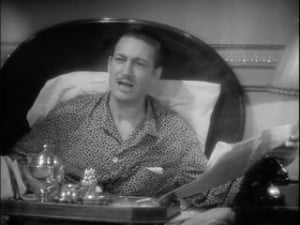 Not only does Bixby- after Anne refuses to help him any further- call an unemployment agency requesting someone “with a sound knowledge of the law,” but at one point Bixby refuses to get out of bed because he “lost his pajama bottoms.” Yes, it gets pretty sophomoric (but great fun) at the end.
Not only does Bixby- after Anne refuses to help him any further- call an unemployment agency requesting someone “with a sound knowledge of the law,” but at one point Bixby refuses to get out of bed because he “lost his pajama bottoms.” Yes, it gets pretty sophomoric (but great fun) at the end.
By the end, Harvey has his Julie back, though I for one am not sure that he really wants her. Most see his deadpan humor and inquiries about her to be rather sincere efforts to get her back. An opposing opinion, most visible when Harvey’s shrugs and sighs mightily on taking her out- again on his arm- leads one also to think that just perhaps he was ready to be rid of her batty delusions of a long lost love.
One of the things that makes Goodbye Again so enjoyable is that it clearly doesn’t take itself overly seriously. As it opens we get the sense that this is going to be a slow and perhaps subtle comedy. Blondell, who is usually so vivacious and bubbly on screen, seems strangely quiet and subdued for the first reel. It is only as the trip to Albany begins that her character starts to develop.
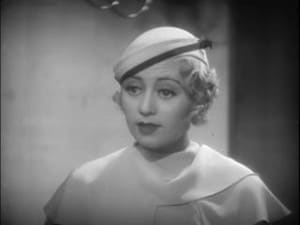 Alternately petulant or snarky, Anne gradually pulls away from Ken, just as he is reaching for to help extricate him from the mess he has gotten himself into. After Cleveland, Ken realizes that Julie won’t be shaken off as easily as his earlier conquests. It is only when Ken is about to sign the settlement papers that Anne confirms what the audience has already strongly suspected.
Alternately petulant or snarky, Anne gradually pulls away from Ken, just as he is reaching for to help extricate him from the mess he has gotten himself into. After Cleveland, Ken realizes that Julie won’t be shaken off as easily as his earlier conquests. It is only when Ken is about to sign the settlement papers that Anne confirms what the audience has already strongly suspected.
She and Ken are also romantically involved, though in what would probably be termed today as an ‘open’ relationship. The random sly glances or witty jibes throughout are a great clue; such as when she is drafting a cancellation letter for him. On reading it back to Ken, she’s changed it from an “I’m sick and need to cancel” note to an “I’ve dallied with a married resident of your fine town and have to head for the hills” one.
Knowing audiences will also spot that Anne and Ken start the film sharing the same bedroom, though in separate beds. It is only in the final minutes that Ann confirms their relationship.
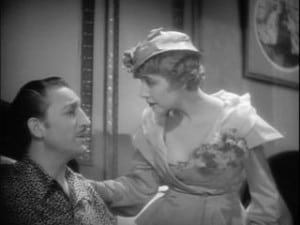 Goodbye Again is well directed by Michael Curtiz, who lets his style change with the dialogue. The earlier and perhaps slower portions of the film are shot using mainly lengthy longer distance shots, which gives one a sense of distance from the goings-on, almost as if you were watching a play. As the pace of the banter and the action increases, Curtiz moves the camera closer into the scene and more and more quick edits and close ups are used. It is so adeptly done as to be almost imperceptible but the result is to effectively engage the audience with this (by the end) almost laugh out loud silliness.
Goodbye Again is well directed by Michael Curtiz, who lets his style change with the dialogue. The earlier and perhaps slower portions of the film are shot using mainly lengthy longer distance shots, which gives one a sense of distance from the goings-on, almost as if you were watching a play. As the pace of the banter and the action increases, Curtiz moves the camera closer into the scene and more and more quick edits and close ups are used. It is so adeptly done as to be almost imperceptible but the result is to effectively engage the audience with this (by the end) almost laugh out loud silliness.
Though hard to find, Goodbye Again is well worth the time. The dialogue is still snappy and witty and least one recent viewer got a few audible chuckles out of it.
